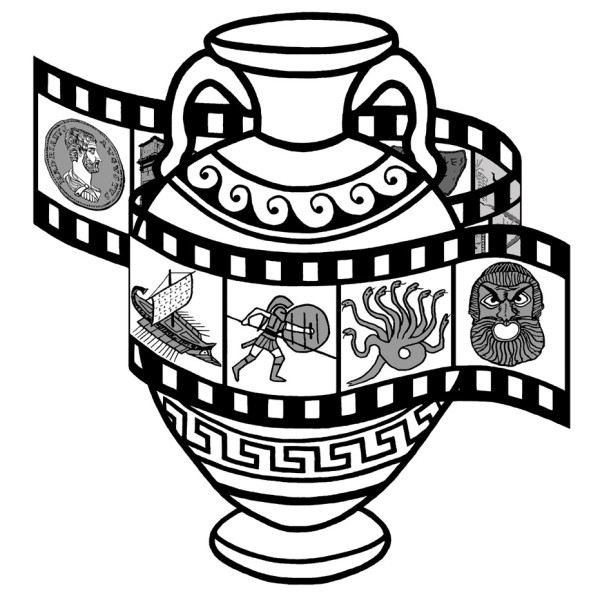Imagines 8
Pagan Pornotopias?
The Reception of Antiquity in Eroticism and Pornography
Madrid, 27-29 September 2023
Programme
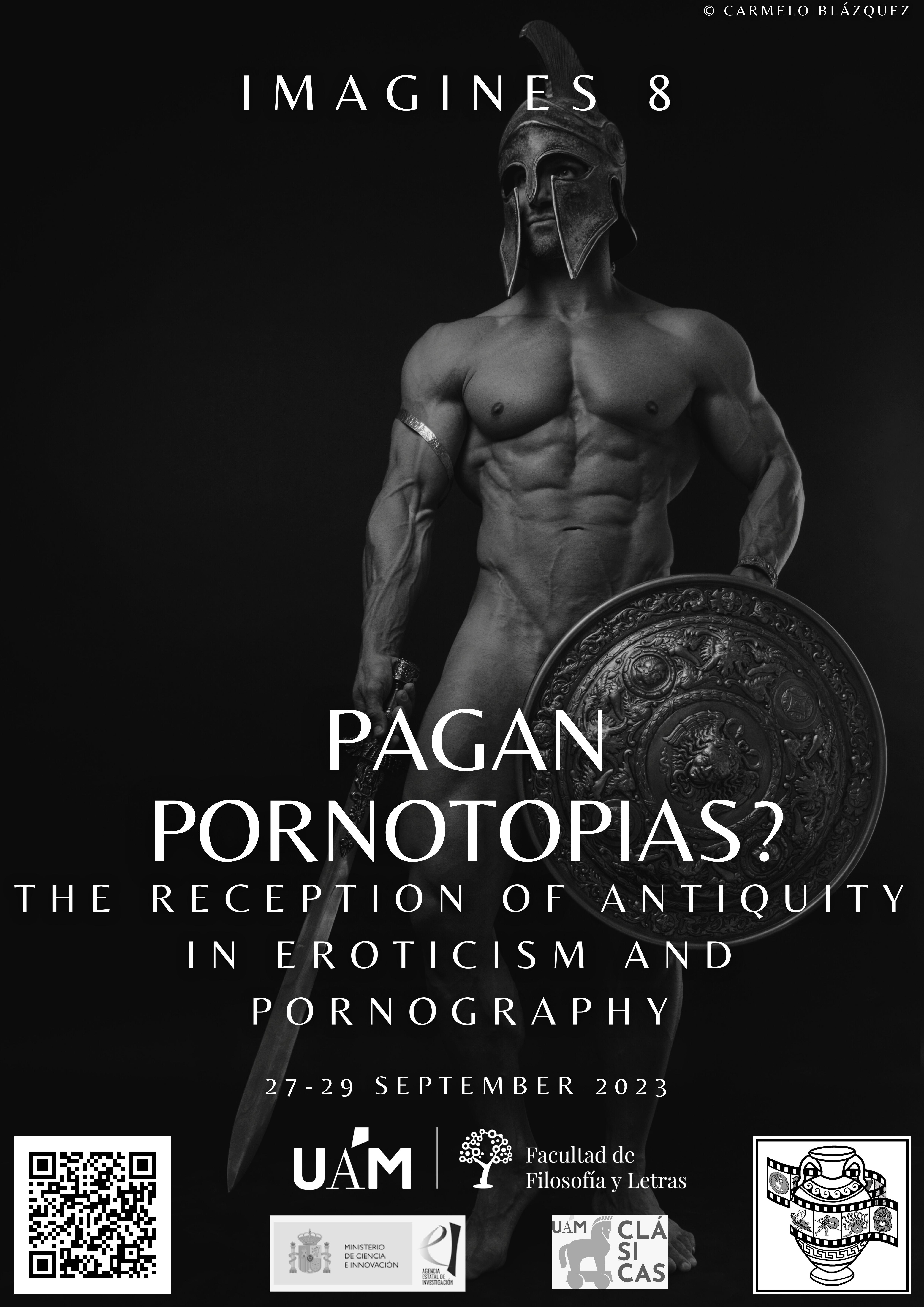
Wednesday, September 27
Place: Centro Cultural La Corrala (Salón de Actos). C/ Carlos Arniches, 3-5
14.00 Registration - Coffee
15.00 Conference Opening – Greetings of the Authorities
Filippo Carlà-Uhink (Potsdam) & Luis Unceta Gómez (Madrid), Introduction
Panel 1: What Aroused Our Forefathers and Foremothers? Antiquity in 18th and 19th Century Eroticism
Chair: Filippo Carlà-Uhink (Potsdam)
15.30 Katherine Harloe (London), Practical Enlightenment: Pagan Pornotopia in Casanova’s Encounter With Winckelmann
15.55 Athena Leoussi (Reading), ‘La joie de vivre’: Modern Hellenism and the Revival of the Life of the Senses
16.20 Discussion
16.45 Coffee Break
17.15 Nikolai Endres (Bowling Green), A Pornotopia in Sicily? The Baron von Gloeden’s Reception of Antiquity
17.40 Stefania Arcara (Catania), “Dark, Virulent, Divine”: the Fin-de-Siècle invention of Sapphic Eroticism in Britain
18.05 Discussion
18.30 Imagines Group Meeting – only for members of Imagines
Thursday, September 28
Place: Facultad de Filosofía y Letras (Salón de Actos). Universidad Autónoma de Madrid
Panel 2: Ancient Models for Modern Sex
Chair: Irene Berti (Heidelberg)
09.00 Anastasia Bakogianni (Auckland), Can Greek Tragic Heroines Ever be Sexy? Eroticism vs. Female Revenge
09.25 Thomas E. Jenkins (San Antonio), Getting to the Bottom of Rufus Wainwright’s Hadrian: Identity and Bravery in Contemporary Opera
09.50 Anise Strong (Kalamazoo), Ancient Sexuality and Modern Video Games
10.15 Discussion
10.45 Coffee Break
Panel 3: So We Dare Speak Its Name: Antiquity in (and for) Homosexual and Queer Desire
Chair: Luis Unceta Gómez (Madrid)
11.15 Filippo Carlà-Uhink (Potsdam), Performing Doric and Ionic Love: Ancient Greece in Gay Male Pornography
11.40 Patricia A. Gwozdz & Markus Lenz (Potsdam), Subversive Hercules. How to Fashion Queer Desire in Popular Culture and Instagram
12.05 David Delbar (Chicago), Domination and the Minotaur
12.30 Discussion
13.00 Lunch
Panel 4: Spatialisations of Lust: Sexualised Antiquity in Architecture and Decoration
Chair: Marta García Morcillo (Durham)
14.30 Jean-Noël Castorio & Stephanie Ferrand (Le Havre), The Monuments of the «Captain Storm» and the Neoclassical Erotism
15.00 Sanja Vucetic (Sheffield), Classical Greek Images of Sex as Modern ‘Adults Only’ Souvenir Art
15.25 Jorge Elices Ocón (Madrid), Marble Breasts and Phalli of Stone: Classical Statues as Erotic Reference and Pornographic Transgression in the Islamic World
15.55 Discussion
16.15 Coffee Break
16.45 Ricardo del Molino (Bogotá), El clasicismo de burdel en América Latina. La antigüedad egipcia, griega y romana en prostíbulos, moteles y hoteles de tránsito hispanoamericanos
17.10 Tanja Kilzer (Siegen), “Sexy Goddesses and Handsome Gladiators” – Eroticized Stereotypes of the Antiquity in the US-American Hotel Business of Jay Sarno in the 1960s
17.35 Discussion
18.00 Coffee Break
18.30 Carmelo Blázquez Jiménez (Barcelona), De héroes y efebos. Referencias clásicas en mi fotografía
Friday, September 29
Place: Facultad de Filosofía y Letras (Salón de Actos). Universidad Autónoma de Madrid
Panel 5: Antiquity Goes Hard: Greece, Rome and the Pornography Debate
Chair: Anja Wieber (Dortmund)
09.00 Martin Lindner (Göttingen), X-Rated Classics – Cinematic Antiquity and the Impossibility to Classify Pornography
09.25 Alastair Blanshard (Brisbane), But Is It Pornography? Locating Obscenity in the Classicising Photographs and Films of Mid-Century Physique Culture
09.50 Florian Freitag (Essen), Traditions Revisited and Continued: Antiquity in the new Physique Pictorial
10.15 Discussion
10.45 Coffee Break
11.15 Charlotte Gregory (London), The Dynamics of Interracial Pornography in Troy: Fall of a City (2018)
11.40 Anna Socha (Liverpool), The Iliad 2: A (Very) Dirty Story. Sexualised Retelling of the Iliad and Odyssey
12.05 Luis Unceta Gómez (Madrid), Pagan Pornotropes. Ancient Rome and the Erotics of Power in Pornographic Comic Books
12.30 Discussion
13.00 Final Discussion and Conclusions
13.30 Lunch
....
To attend in presence or online, please register by sending an email to This email address is being protected from spambots. You need JavaScript enabled to view it..
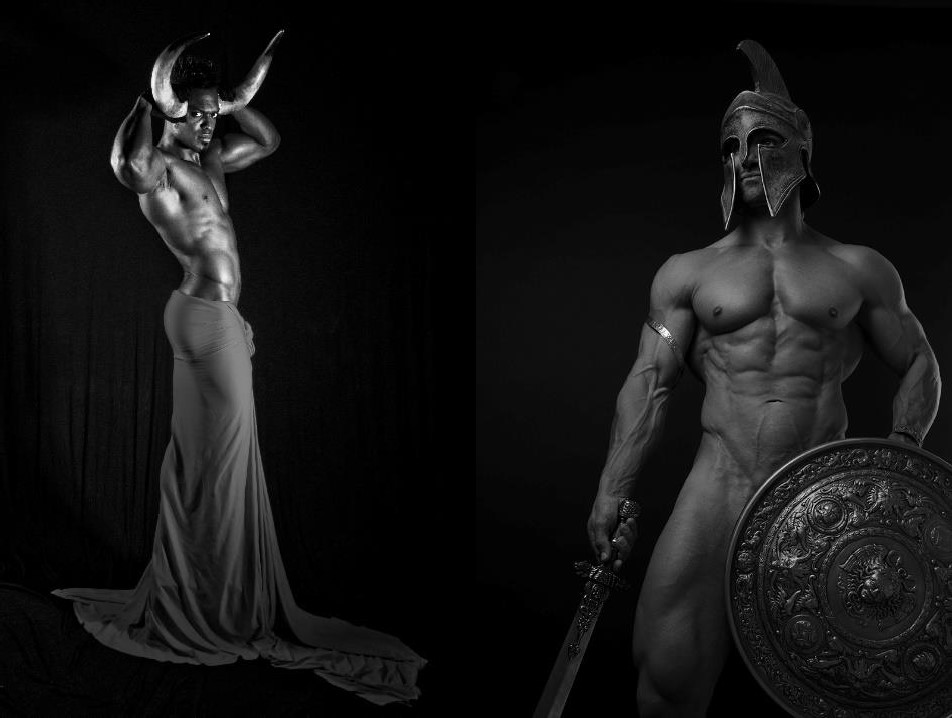
© Carmelo Blázquez
Pagan Pornotopias?
The Reception of Antiquity in Eroticism and Pornography
Madrid, 27.-29 September 2023
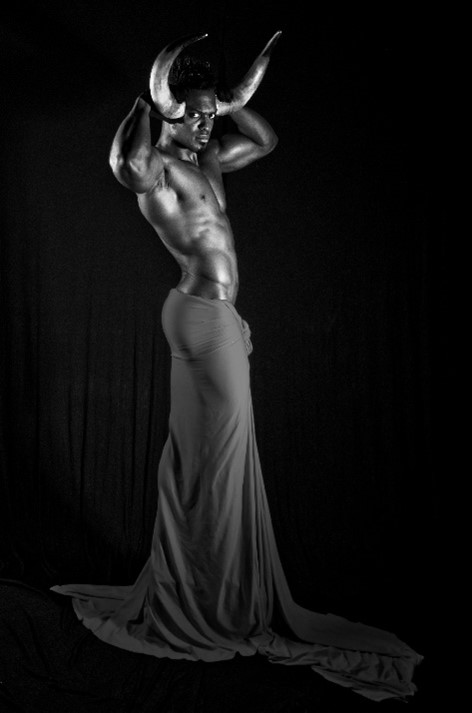
© Carmelo Blázquez
The eighth conference of the Imagines group, which will take place at the Universidad Autónoma de Madrid (Spain) on September 27th-29th, 2023, will be dedicated to the reception of ancient cultures, especially Greece and Rome, in eroticism and pornography from the 19th century to the present. Consistently with the main research aim of the Imagines group (https://www.imagines-project.org/), the focus will be on the reception of the ancient world in visual and performative erotic and pornographic productions (a discussion at theoretical level of characters of and differences between eroticism and pornography is also welcome, within the conference’s main topic, the reception of Antiquity).
It has been recently pointed out that ancient Rome indeed can be defined in the modern Western popular culture as a “pornotopia”, in which the most diverse and deviant form of sexual practice and desire can be located. An important aspect of this eroticised characterisation of ancient Rome is its implicit opposition to Christian morality (and sexual repression), which derives from the narratives of Christian chastity and martyrdom that have been so widespread and relevant in Western cultural memory since the Middle Ages. Yet this is not the only reason that has fostered a markedly erotic relationship between the modern times and the ancient world. At the same time, indeed, ancient Greece has played a crucial role in constructing and legitimating same-sex attraction – and Plato (and in particular Aristophanes’ speech in the Symposium) has been deployed since the 19th century to provide the – particularly male – gay community with a legitimating narrative within the frame of European philhellenism. As formulated in 1961 by ONE magazine for example, “almost the first thing that any [male] homosexual does, when called upon to offer any serious defense of homosexuality, is to draw upon the glorious example of the manly Greek warriors and athletes who apparently practiced homosexual love openly and without shame”. Similarly, ancient historical or mythological figures such as Sappho or the Amazons have been deployed to shape and legitimise female homosexual identity. Other ancient peoples – the Persians, the Egyptians, the Etruscans, just to name some examples – have been portrayed since Antiquity and through typical mechanisms of Othering as sexually deviant from the assumed “norm”; this has also filtered into modern receptions, which often replicate, translate and modify the Orientalist stereotypes already widespread in the ancient world (one can think of the representation of the Persians as “sexually deviant” in the blockbusters 300 and 300: Rise of an Empire).
The aim of this conference is to investigate the role played by the ancient world in shaping erotic and pornographic representations, and thus in representing and structuring attraction and desire. This analysis will help in understanding how references to Antiquity play, at a more or less conscious level, a crucial role in defining, stereotyping, constructing in discourse and legitimating sexual identities, sexual orientations, gender belonging and performance.
Confirmed speakers include, together with the organisers and editors of the volume, Luis Unceta Gómez (UAM) and Filippo Carlà-Uhink (Universität Potsdam): Anastasia Bakogianni (Massey University), Alastair Blanshard (The University of Queensland), Thomas Jenkins (Trinity University), Athena Leoussi (University of Reading), Martin Lindner (Universität Göttingen), Anise K. Strong (Western Michigan University).
See conference programme and abstracts.
The conference programme will also include a meeting and public discussion with Carmelo Blázquez, an internationally renowned photographer specializing in male nude photography (https://www.carmeloblazquez.com/).

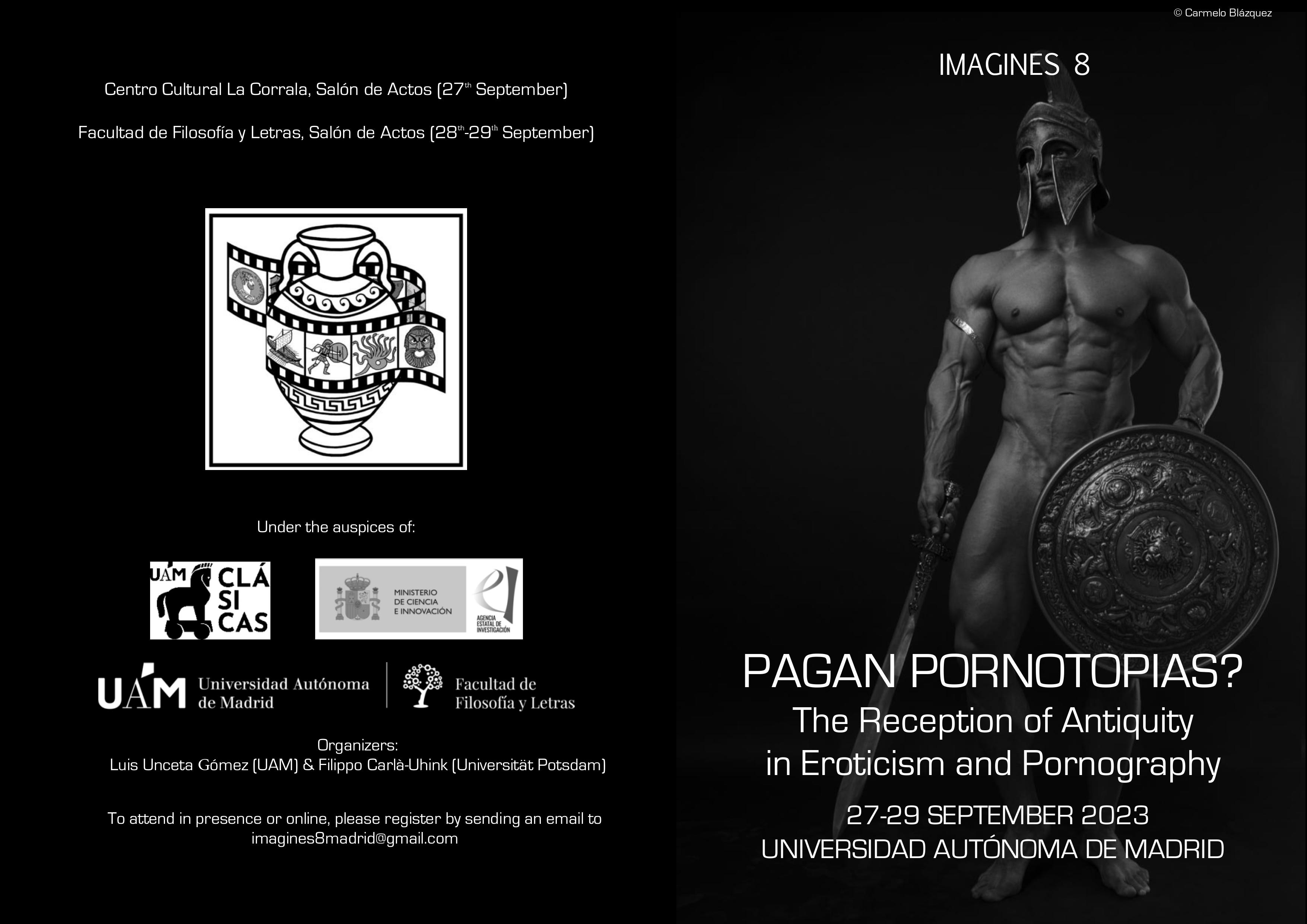
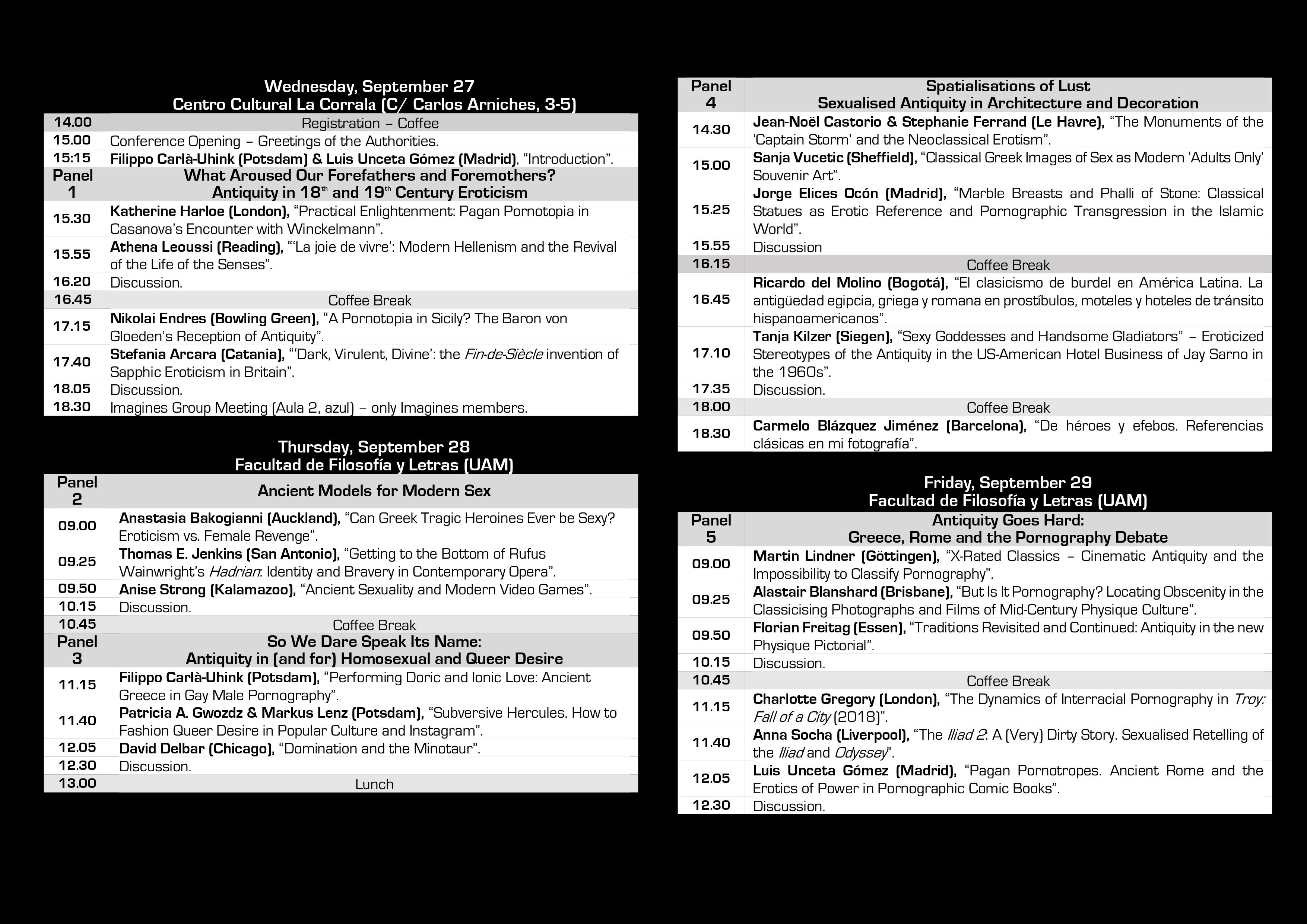
© Carmelo Blázquez


The Imagines logo integrates in one single design the interaction between different artistic expressions that shapes our project. A logo is an image that synthesises a concept. In this case, the challenge was to create a recognising concept that could transmit the idea of the dynamic dialogue between the ancient and the modern mediated by the arts. The logo is the outcome of the creative research and design work of our collaborators from Barcelona Ainize González and Nacho García, both art historians.
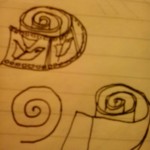 Making of: The starting point that triggered the design was to find an element that through movement could express and link transversality and intermediality, both key concepts that define the work and aims of our research network. Figure 1 shows a still very schematic sketch of a celluloid, a tool that embodies both movement and image.
Making of: The starting point that triggered the design was to find an element that through movement could express and link transversality and intermediality, both key concepts that define the work and aims of our research network. Figure 1 shows a still very schematic sketch of a celluloid, a tool that embodies both movement and image.
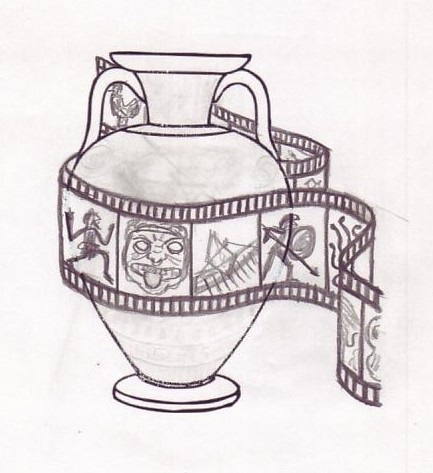 On the next image (Fig. 2) we see a prototypical Greek amphora surrounded by celluloid that includes several ancient motives. Painting, theatre, dance and mythology are represented in this proto-design.
On the next image (Fig. 2) we see a prototypical Greek amphora surrounded by celluloid that includes several ancient motives. Painting, theatre, dance and mythology are represented in this proto-design.
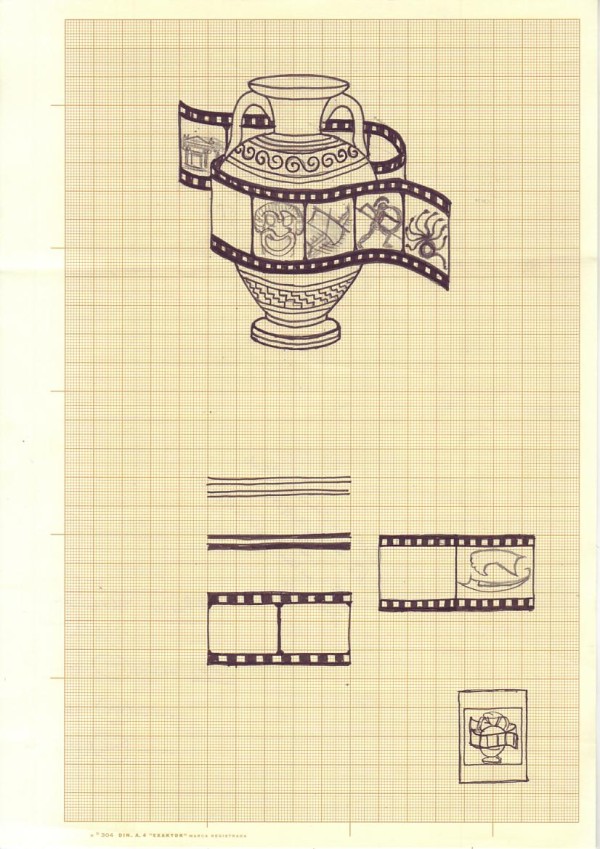 The next illustration (Fig. 3) expands this idea and displays the definitive proportions of the celluloid. Some geometric motives have been added on the amphora. The choice of the amphora is explained by its double functionality both as a pictorial support and as an artistic object per se.
The next illustration (Fig. 3) expands this idea and displays the definitive proportions of the celluloid. Some geometric motives have been added on the amphora. The choice of the amphora is explained by its double functionality both as a pictorial support and as an artistic object per se.
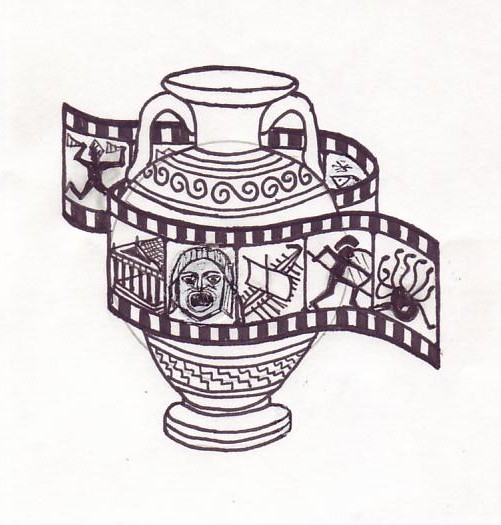 Fig. 4 brings together the concepts that had been considered in previous phases, but still does not whow a coherent narrative.
Fig. 4 brings together the concepts that had been considered in previous phases, but still does not whow a coherent narrative.
On the following illustration (Fig. 5), proportion and symmetry are aligned and one of the frames is removed in order to improve the geometric harmony of the design.
Figure 6 displays the definitive design. At both ends of the celluloid we see two static motives while those depicting dynamic elements occupy the centre of the composition, which aims to enhance movement to the object. The choice of these motives took into consideration the research interest of members and collaborators of Imagines.
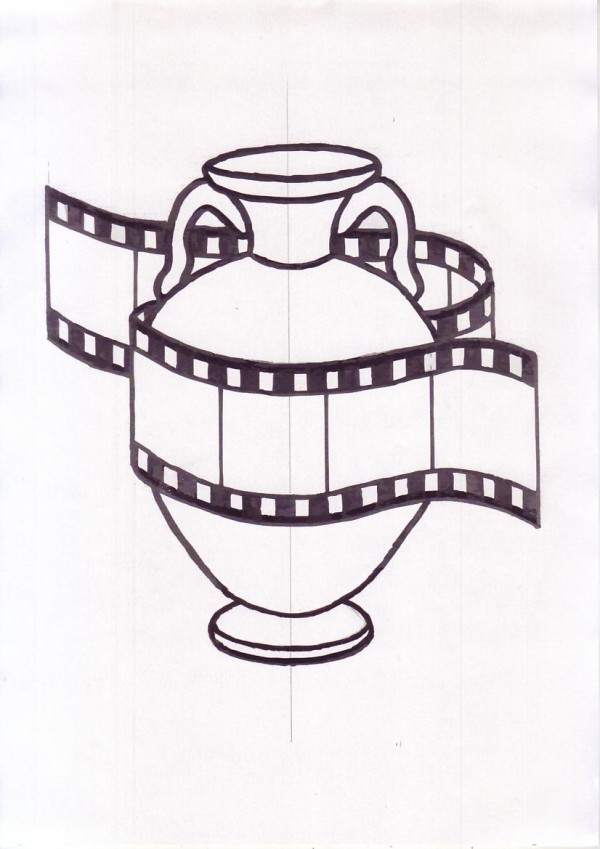 Performing arts and sculpture are represented by a theatrical mask; the Arch of Titus features monumental and urban architecture; the Hadrianic coin stands out as a symbol of the Roman Empire; it epitomises “official art” and the iconographies of power; the ship symbolises the ancient Mediterranean as a place of cultural encounters, travelling and dialogue; the inscription is the testimony of the memory of the past, while the painting and the mosaic perform not only as ornaments, but also as narrative elements that mirror society and everyday life.
Performing arts and sculpture are represented by a theatrical mask; the Arch of Titus features monumental and urban architecture; the Hadrianic coin stands out as a symbol of the Roman Empire; it epitomises “official art” and the iconographies of power; the ship symbolises the ancient Mediterranean as a place of cultural encounters, travelling and dialogue; the inscription is the testimony of the memory of the past, while the painting and the mosaic perform not only as ornaments, but also as narrative elements that mirror society and everyday life.
Finally, the red- and black-figure motives, which are inspired by the iconography of real Greek kraters, exemplify the central place that mythology plays both in Antiquity and in Classical Reception.
The image below is a diagram that comprehends all these ideas and displays the specific iconographic sources that inspired the figures.
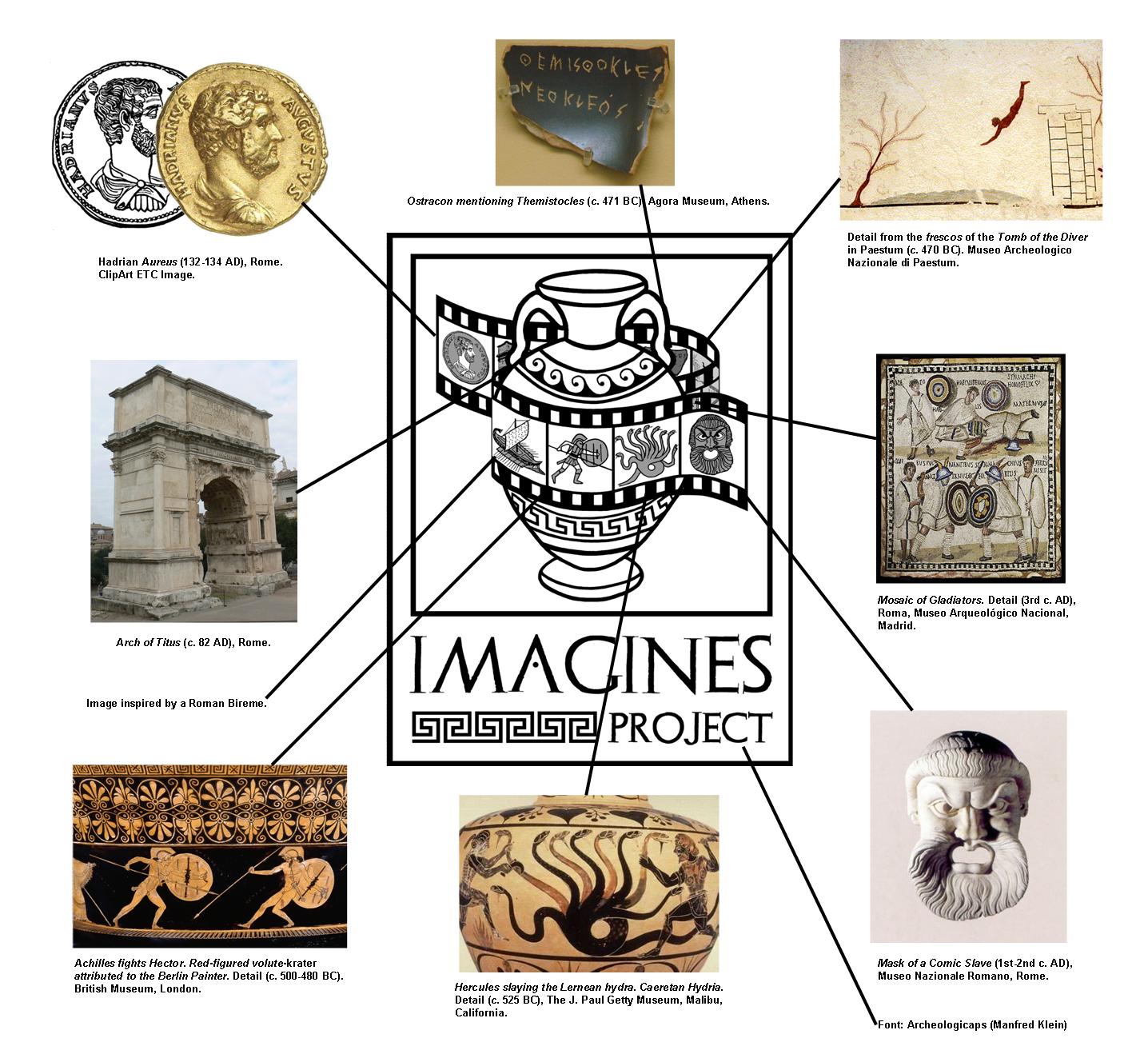
 The logo fits into a frame that also includes a new typography. This element found its inspiration in the revolutionary designs of the Wiener Werkstätte, a strand of the famous fin-de-siècle Secessionist movement that aimed to unify the practical and the aesthetical. The typography, which is called Archeologicaps, has been created by the designer Manfred Klein, and presents reminiscences of Roman monumental epigraphy.
The logo fits into a frame that also includes a new typography. This element found its inspiration in the revolutionary designs of the Wiener Werkstätte, a strand of the famous fin-de-siècle Secessionist movement that aimed to unify the practical and the aesthetical. The typography, which is called Archeologicaps, has been created by the designer Manfred Klein, and presents reminiscences of Roman monumental epigraphy.
The Imagines logo features also now very nicely on the beautiful covers of the Imagines book series volumes, published by Bloomsbury (link to the series):
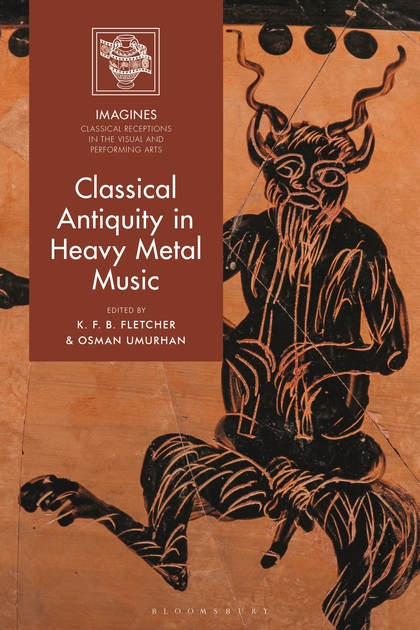
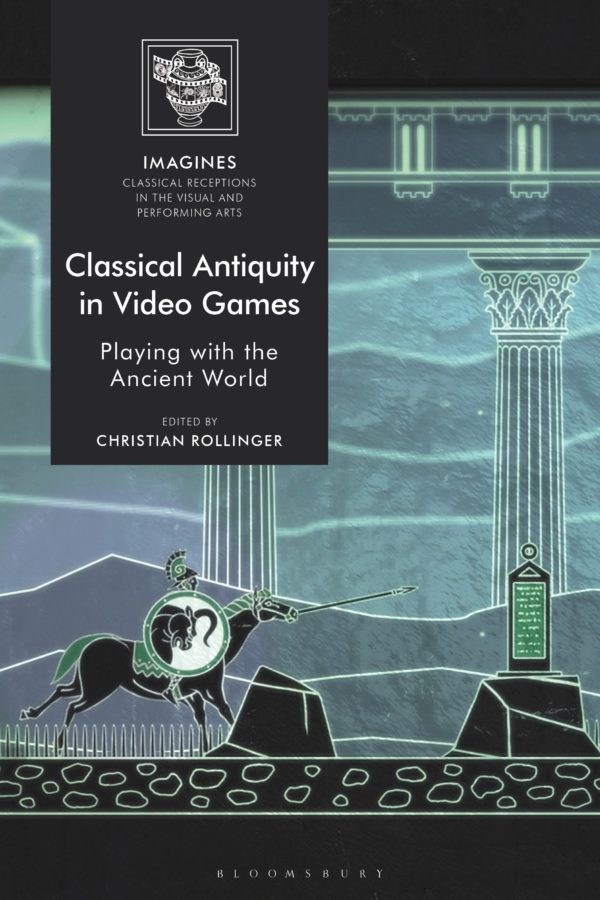
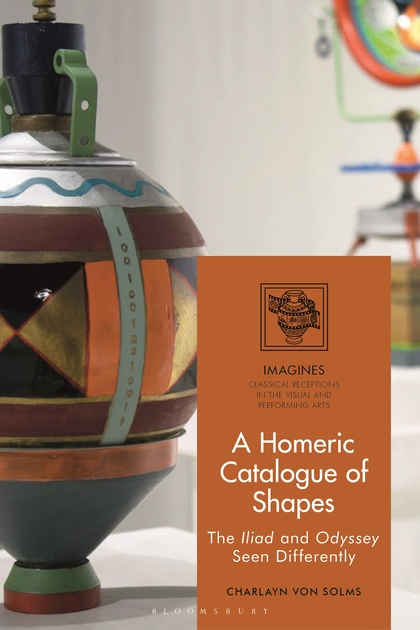
Join the team!
Would you like to become a collaborator of IMAGINES?
Just download, fill the form you will find below this message and send it to the following email address: This email address is being protected from spambots. You need JavaScript enabled to view it.. We will include your name, affiliation and any relevant links in our website and update you about events, conferences and news linked to our project and network.
adhesion-form-as-collaborator-imagines
Current collaborators:
AUSTRIA
-
Nicole Haitzinger, Professor in Art History, Music and Dance Studies, Paris Lodron Universität Salzburg
BELGIUM
-
Stefano Moschini, Degree in Classics and Film and Media, Degree in Education, Primary school teacher Brussels (Belgium)
BRAZIL
-
Maria Cecília de Miranda Nogueira Coelho is Associate Professor in Ancient Philosophy at the Universidade Federal de Minas Gerais (Brazil). She works on Greek Rhetoric and Dramatic Literature, specifically on Gorgias and Euripides. She is also specialised in the Reception of Greek Tragedy in Modern Theatre and Cinema, the Theory of image in Plato, and Classical patterns in the Sermons of the Jesuit Antonio Vieira. Her recent publications include contributions on Gender and Classics in the Western genre, and the Reception of Helen and Medea in films. She is the director of the Project Touching the Past in Brazil, which connects Greek material culture and Philosophy. Link to Academia. Link to CV Lattes.
-
Elaine Cristine Sartorelli, Professor of Classical Studies (Latin language and literature) at the Universidade de São Paulo – São Paulo (Brazil). She has extensively worked on the on the polemics on imitation in the 16th century (Erasmus against the Ciceronians). She is also interested in the reception of ancient narratives in cinema. Link to website. Link to profile.
FRANCE
-
Anne Bajard, Lecturer in Latin Language and Literature at the Université Bordeaux-Montaigne, member of the Research Institute Ausonius. She is an specialist in roman spectacles, imperial power and Roman art. Link to profile.
-
Tiphaine Annabelle Besnard, ATER (Attachée Temporaire d’Enseignement et de Recherche), LESA EA 3274, Aix-Marseille Université (France). Her research focuses on Antiquity in contemporary art (since the 80s), Member of Antiquipop
-
Fabien Bièvre-Perrin, Postdoctoral fellow at LabexMed/Gerda Henkel, IRAA (USR 3155 CNRS/AMU) (France), Member of Antiquipop
GERMANY
-
Alejandro Cadenas González, teaching fellow in Ancient History at the Universität Potsdam. His Phd (Potsdam 2021) focuses on the divine image of the emperor in the Theodosian period. More generally, his research revolves around the imperial cult, religious image of Roman emperors, and Roman art. He is also interested in modern echoes of imperial ideas, in particular in the uses of ancient ideas of monarchy, republic and empire in fantasy and science fiction sagas such as Star Wars, Dune, The Whitcher and Warhammer 40.000. Link to website. Link to profile.
-
Pasquale Ferrara, teaching fellow in Ancient History at the Universität Potsdam. He holds a PhD in Classical Archaeology by the Università Roma Tor Vergata and writes currently his second PhD in Ancient History at Potsdam. Pasquale's research focuses on gender and women studies. He has extensively studied the representation of the Maenads or Bacchae in ancient art and is now working on the reception of ancient Maenads in pop culture, specially in comics and video games. Pasquale is also interested in "Dionysian personas" in modern reception. His publications include Mainàs. Studi sulle menadi nella statuaria greca e romana (IRAW, 8) (Roma 2020) (monograph); Baccanti ebbre e ninfomani tra la fine della Repubblica e la prima età imperiale, Graeco-Latina Brunensia 28, 1 (2023), 19–31. Link to profile
-
Christian Rollinger, Lecturer in Ancient History at the University of Trier. He is specialised in the late Roman republic and Late Antiquity, an is interested in Classical receptions throughout ‘new’ and digital media, in particular in historical video games. Link to website
-
Yvonne Vosmann, PhD student at the Georg-August-University Göttingen (Germany). Specialised in Egyptology
ITALY
-
Domitilla Campanile, Associate professor at the Università di Pisa (Italy). Specialised in Roman History, she also works on historical films and on the reception of the Roman Empire in modern popular culture, link to website
-
Maria G. Castello, Lecturer at the Università di Torino (Italy). Ancient Historian specialised in Late Antiquity. Specialised in manga, anime and their connections with the Classical World, link to website
-
Morena Deriu, Università degli Studi di Cagliari. Lecturer specialised in Ancient Greek Literature and interested in the Reception of Classics in comics and contemporary cinema and literature. Her published works include an article in the journal Ítaca on Amazons, Wonder Woman and gender identity in cinema and comics. Link to website and further publications
-
Genevieve Gessert, Director of General Education, Associate Professor & Interim Director of the Archaeology and Classics Program, The American University of Rome (Italy). Specialist in Classical Receptions, specially comics and cinema, link to website
POLAND
-
Małgorzata Budzowska, Assistant Professor at the University of Łódź (Poland). Her research is mainly focused on the reception of ancient myths in contemporary theatre. I cooperate with the APGRD (University of Oxford) and Jocasta. Classical Reception Greece. Link to website
SPAIN
-
Oskar Aguado, Researcher at the University of que Basque Country and secondary school teacher, Vitoria (Spain), Ancient Historian specialised in Classical Receptions in Cinema, member of ANIHO.
-
Ainize González, Assistant-Curator at the Museum of World Cultures, Barcelona (Spain). Phd in Art History and Musicology, specialised in 20th century art, link to website
-
Ana González-Rivas Fernández, Senior Lecturer in English Studies at the Universidad Autónoma de Madrid. She works on Anglo-American Gothic and Fantastic Literature, Comparative Literature, Myth Criticism and Reception Studies. Her PhD thesis (2010), explored the connections between Greco-Latin literature and Anglo-American Gothic Literature (book 2011, available open-access). In recent years, she has focused more specifically on the receptions of myth and its study from the perspective of Myth Criticism. Ana is particularly interested in the reception of Classics in popular culture, including literature, comic books, and films. Currently she is the secretary of the SELGyC (Spanish Association of Comparative Literature), the secretary of Asteria (International Association of Myth Criticism) and a member of the Governing Board of the EAPSA (Edgar Allan Poe Spanish Association). Along with her academic work, she has taken part in the organisation of some cultural events, such as the Madrid Gothic Week and a number of activities related to the Madrid Science Week. Her publications also include “Somnium Imago Mortis. Classical Myth in the Pre-Raphaelite Painting”, The International Journal of the Humanities: Annual Review 11 (2013), 35-50; “Reconstructing the Myth of Lamia in Modern Fiction: Stories of Motherhood, Miscarriage, and Vengeance." The International Journal of the Humanities: Annual Review 16:1 (2018), 25-38; “From Myth to Comic: Rayco Pulido’s Lamia”. Journal of Comics and Graphic Novels (2022); “De madre a monstruo: claves estéticas (y éticas) para la recepción del mito de Lamia en la modernidad”, in: En los márgenes del mito: Hibridaciones de la mitología clásica en la cultura de masas contemporánea, ed. Luis Unceta and Helena González (Editorial Los libros de la Catarata / Universidad Autónoma de Madrid), 2022, 61-84. Link to website and profile
-
Alberto P. Martí, Madrid (Spain), Phd in Archaeology by the University of Nottingham. Director of ArkeoPlanet
-
Emilia Mataix Ferrándiz, Maria Zambrano fellow at the University of the Basque Country (Spain), previously at University of Helsinki and at the Käte Hamburger kolleg Münster. She works on Roman Law, maritime trade and the economy, and is the author of Shipwrecks, Legal Landscapes and Mediterranean Paradigms: Gone under Sea (Brill 2022). She collaborates with the research project Structural Determinants of Economic Performance in the Roman World, the ERC Project “Spaces of Roman Republicanism” and the Centre of Excellence in Law, Identity and the European narratives. She is one of the coordinators of the Research network ‘Engendering Ancient Economies’, and of the research cluster Down by the water. Global Conversations in Maritime Archaeology. She is very interested in the reception of Classics in comics and in the uses of antiquity in the branding and marketing strategies of the food industry. Link to profile and publications.
-
Montserrat Reig Calpe, Classical Philologist, Research Fellow at ICAC, Tarragona and lecturer at Institut Joanot Martorell, Esplugues del Llobregat, Barcelona (Spain). She works mostly on Classical Receptions in 20th and 21st centuries Theater and Opera.
-
Alejandro Valverde García, Classical Filologist and teacher at the Instituto Santísima Trinidad / Baeza, Jaén (Spain). He has extensively worked on Classics and Cinema, with special focus on Ancient Greek Tragedy in Screen.
SOUTH AFRICA
-
Michela Piccin, Assyriologist working on Ancient Near East cultures, languages and their reception. Currently at the Faculty of Theology of the North-West University in South Africa. She was previously lecturer at the Institute of Ancient Civilisation, Northeast Normal University, Changchun (China). Her publications include the monograph Linguistic Aspects of Persuasiveness in Akkadian: Pettitions and Prayers (Berlin 2021), and the articles Assyrian Treaties: "Patchwork Texts", Journal of Ancient Civilization 35.1, 2020, 33-70, and Mortality and Fame in Akkadian Texts, Journal of Ancient Civilizations 33.1, 2018, 1-25. Michela was also organiser of the public event Gilgamesh in 12 Hours (Changchun 2018), a theatrical dramatisation of the epic poem accompanied by live music exclusively created for the event. Link to profile
UNITED KINGDOM
-
Richard Cole, University of Bristol. Research Associate in Ancient Greek History and Virtual Reality. He works on Virtual Antiquity and on the AHRC-funded Project ‘The Virtual Reality Oracle (VRO): An Immersive Experience of the Ancient Greek Oracle at Dodona,’. He is interested in design and video games and multimedia. Link to the VRO website. Link to profile
-
Joyce Datiles, Research Associate, Dept. of Greek & Latin at UCL. Dual doctorate in Ancient History and Anthropology in UCL. Film director and writer. Research on ancient battles as well as the aesthetics and concepts of heroism, both in history and on screen. She is cofounder of the production company The Spectacle Makers Productions. She is one of 10 emerging female filmmakers selected for Creative England´s inaugural Industry Equals: Women in Screen 2020. She is author of the historical drama Sceptre (2020), the historical fantasy series Moon Fight (2020) and the forthcoming To See the Corpse Alive. Link to website
-
Penny Goodman, Associate Professor in Classics at the University of Leeds (UK). Specialised in Roman history; Roman urbanism; the emperor Augustus and his post-classical afterlives. link to website
-
Ersin Hussein, Swansea University (Wales, UK), Teaching Associate Roman History with focus on ancient Cyprus
-
Silke Knippschild, Senior Lecturer in Ancient History at the University of Bristol (UK). Her work focuses on intercultural relations and cross-cultural influences between Ancient Western Asia, Greece, and Rome. Cofounder of Imagines, organiser and co-editor of Seduction and Power.
-
Athena S. Leoussi, Associate Professor in European History / Cultural Historian with a focus on the visual arts. She is interested and has extensively worked in the following research areas: Classicism in 19th-century art in England and France; Classicism and Nationalism – the nationalisation of the Classical Tradition in 19th and 20th c Europe; the reception of the Classical physical ideal/the Greek body in 19th and early 20th centuries Europe; Classicism in modern political architecture. Her publications include: Leoussi, A. (2020) ‘La formation d’une identité Européenne’. In Davion, Isabelle and Heuser, Beatrice (eds.) Batailles: Une Histoire des Grands Mythes Nationaux Paris: Belin, 21-32; Leoussi, A. (2020) ‘Art, architecture and nationalism’. In: Greenfeld, L. and Wu, Z. , (eds.) Research Handbook on Nationalism. Edward Elgar, Oxford; Leoussi, A. (2018) ‘Making everyone Greek: citizens, athletes, and ideals of nationhood in nineteenth-century Britain, France, and Germany’. In: Harloe, K. , Momigliano, N. , Farnoux, A. , (eds.) Hellenomania. Routledge, London, 100-125; Leoussi, A. (2018) ‘Famous battles and their after-life: a framework’. In: Heuser, B. and Leoussi, A. , (eds.) Famous Battles and How They Shaped the Modern World c.1200 BCE - 1302 CE: From Troy to Courtrai, vol.1. Barnsley (UK): Pen and Sword, 1-19.
-
Amanda Potter, Visiting Fellow at the Open University. Her research research interests include classics in film and television and creative engagement with the ancient world via creative writing. She has published on Wonder Woman, Doctor Who, Game of Thrones, HBO Rome, Starz Spartacus, BBC Atlantis, Xena: Warrior Princess, Charmed and Buffy the Vampire Slayer. She is co-editor (with Hunter Gardner) of Ancient Epic on Film and Television, (EUP, forthcoming December 2021). Link to profile and website
UNITED STATES
-
Jim Cogswell, Arthur F. Thurnau Professor of Art & Design at the Stamps School of Art & Design, and Affiliated member of the Department of Classical Studies of University of Michigan, Ann Arbor. Jim is also a visual artist. His public art projects are based on his research into artifacts from Antiquity in museum collections. These projects have also set to multiple series of drawings and paintings on paper. His installations include “Cosmogonic Tattoos” (Ann Arbor 2017); “Vinyl Euripides” (Cacoyannis Foundation, Athens 2022); “Hands, Nets, and Other Devices”(International Museum of Contemporary Sculpture, Santo Tirso, Portugal 2023). To find more about his work, see jimcogswell.com. Link to profile
-
Thomas E. Jenkins, Trinity University, Sant Antonio, Texas (US). Professor of Classics interested in the reception of Antiquity in contemporary media, including novels, theater, and video games. Link to website
-
Giacomo Loi, PhD candidate in Classics, Johns Hopkins University (Baltimore, US). He works on the reception of classical culture in Modern Hebrew culture (literature, cinema, figurative arts), on Italian Renaissance culture and Italian Jewish culture. Currently researching on the representation of Romans in pre-Israeli Jewish cinema. Link to website.
- Charles W. Oughton, Assistant Professor of Classical Studies, specialised in Greco-Roman Historiography and Classical Reception. Charles is most interested in the reception of the ancient world in tabletop gaming and exploring how the prevalence of games with themes or settings drawn from antiquity impacts public perception of the Greco-Roman worlds. He is the Co-designer of D.E.S.Troy: a synchronous Zoom-based role-playing game set during the Trojan War and DE.S.Troy-Live!, its in-person adaptation for the classroom. He is the author of “Roman Heroes at Helm’s Deep” in Thersites 15 (2022): 123-162 and the co-organizer of a panel on Classical Receptions in Tabletop Gaming for the Celtic Conference in Classics in Cardiff, Wales, in July 2024; which included his paper “A Typology of the Receptions of Antiquity in Tabletop Gaming”. His public papers include: “Playful Receptions: Viewing the Classical Tradition through modern Board Games” – public lecture given at Utah State University’s Classics Day celebration (2022). Link to profile and website
- Michael Seymour, Assistant Curator at the Metropolitan Museum of Art, Ancient Near and Eastern Art, New York (US). He works foremost on Ancient Babylon and its modern visual receptions. Link to website
News & Events
-
Multimodal Landscapes of Mediterranean Antiquity. Workshop, 25-27 April 2024, Essen
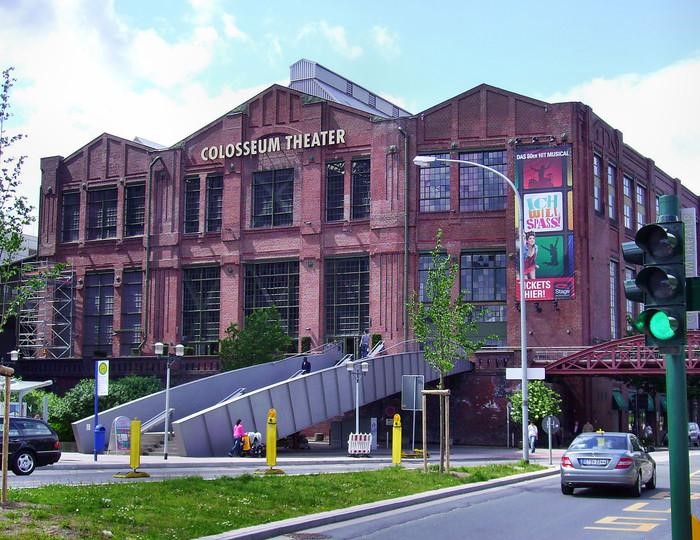
The workshop “Multimodal Landscapes of Mediterranean Antiquity” was supported by and held at the College of Social Sciences and Humanities of the Ruhr University Alliance, Essen on 25-27 April 2024. Several members of Imagines, including both organisers, participated in this exploratory event which catalogued and study existing and remembered imageries of ancient pasts in the city of Essen. Co-organised by Senior Fellow Marta García Morcillo (Durham University, UK) and her tandem partner Florian Freitag(University of Duisburg-Essen), this experimental project united researchers from different fields to investigate cultural artifacts and signs on site, including advertising, branding, photographs, and street art as well as permanent, ephemeral, and vanished architectural elements and recorded events that establish connections between ancient Mediterranean cultures and Essen’s modern cityscape (19th to 21st centuries). This pilot project will serve as a case study for an interactive...
-
News. Coming event. Imagines 8. Pagan Porntopias? Poster and Programme, Madrid 27-29 Sep. 2023

News: Imagines 8 is coming! Here the poster, programme, and information to attend: Pagan Pornotopias? The Reception of Antiquity in Eroticism and Pornography, Madrid, 27 to 29 September 2023.
-
Lecture and Workshop: Greek and Roman Antiquity for Children and Young Adults, Potsdam 5 and 7 July 2023

LECTURE GIRL TO WOMAN: THE MYTH OF PERSEPHONE IN YOUNG ADULT FICTION Cristina Salcedo González Universidad Complutense de Madrid 5th July 2023 / 18.00 CAMPUS Am Neuen Palais House 9 / Room 1.02 This lecture investigates the representation of a very popular figure from ancient myth, Persephone, in young adult fiction, analysing a series of examples from a range of anglophone cultures and contexts (New Zealand, South Africa, UK and USA). It will be shown that Persephone can represent and cover a broad range of diverse actual issues, ranging from LGBTQI+ desire to eating disorders, from partner violence to parental mental health, from PTSD to caring responsibility. Through Persephone’s example it will be shown how relevant Greek mythology still is in contemporary cul- ture – and specifically in the entertainment and forma- tion of young adults in the anglophone world. WORKSHOP GREEK AND ROMAN ANTIQUITY FOR CHILDREN AND YOUNG ADULTS 7th July 2023 / 10.00 WIS Bildungsforum Potsdam 10.00...
-
New: Imagines Book series, Vol. 14

Volume 14 of the Imagines book series announced The Reception of Cleopatra in the Age of Mass Media by Gregory N. Daugherty
-
Antiquity in silent films from the Tom Stern Collection
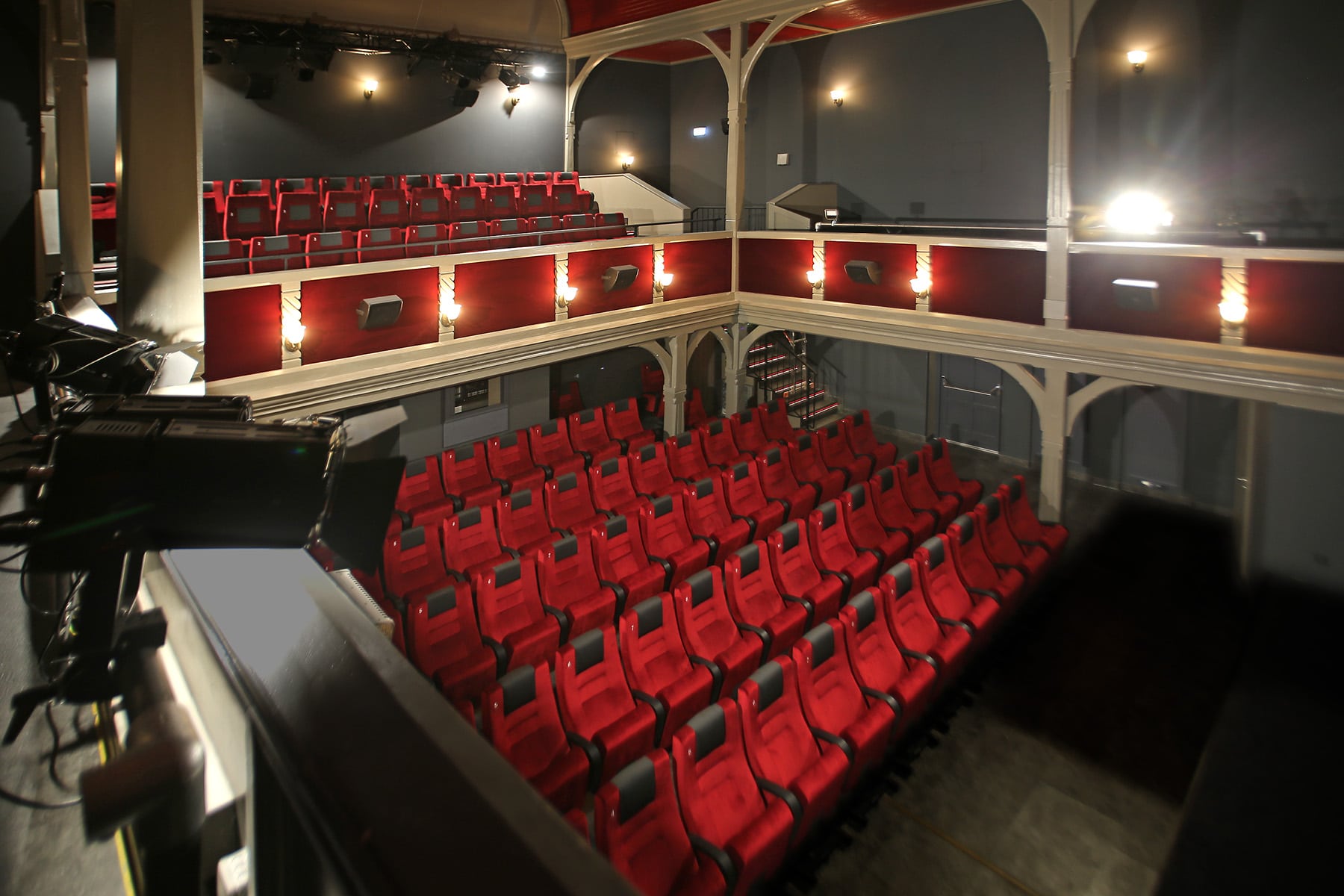
Antiquity in silent films from the Tom Stern Collection shown at the 5th Göttingen Night of Science (5 July 2022) Cinema Méliès, Göttingen
-
Conference: Performing Ancient Greek Literature in a Time of Pandemic (23-24 June 2022)
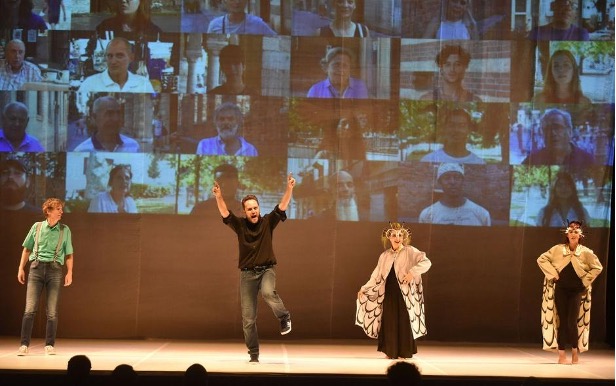
Organizers: Anastasia Bakogianni (Massey University, New Zealand) and Barbara Goff (University of Reading, UK)

